| Listing 1 - 10 of 35 | << page >> |
Sort by
|
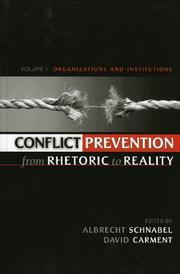
ISBN: 0739105493 0739107380 0739105507 0739107399 Year: 2004 Publisher: Lanham Lexington books
Abstract | Keywords | Export | Availability | Bookmark
 Loading...
Loading...Choose an application
- Reference Manager
- EndNote
- RefWorks (Direct export to RefWorks)
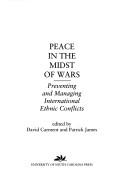
ISBN: 1570032173 Year: 1998 Publisher: Columbia (S.C.) University of South Carolina Press
Abstract | Keywords | Export | Availability | Bookmark
 Loading...
Loading...Choose an application
- Reference Manager
- EndNote
- RefWorks (Direct export to RefWorks)
Conflict management. --- Culture conflict. --- Ethnic relations --- International relations. --- Political violence. --- Political aspects.
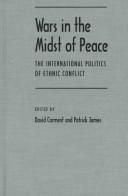
ISBN: 0822956268 Year: 1997 Publisher: Pittsburgh University of Pittsburgh
Abstract | Keywords | Export | Availability | Bookmark
 Loading...
Loading...Choose an application
- Reference Manager
- EndNote
- RefWorks (Direct export to RefWorks)
#SBIB:327.5H21 --- #SBIB:327.1H10 --- #SBIB:324H72 --- #SBIB:AANKOOP --- Vrede – oorlog, oorlogssituaties --- Internationale betrekkingen: theorieën --- Politieke verandering: conflictlijnen, nationalisme/federalisme --- Conflict management. --- Culture conflict. --- Ethnic conflict. --- Ethnicity. --- International relations. --- Secession. --- Conflict management --- Culture conflict --- Ethnic conflict --- Ethnicity --- International relations --- Secession --- Sovereignty --- Separatist movements --- Coexistence --- Foreign affairs --- Foreign policy --- Foreign relations --- Global governance --- Interdependence of nations --- International affairs --- Peaceful coexistence --- World order --- National security --- World politics --- Ethnic identity --- Group identity --- Cultural fusion --- Multiculturalism --- Cultural pluralism --- Conflict, Ethnic --- Ethnic violence --- Inter-ethnic conflict --- Interethnic conflict --- Ethnic relations --- Social conflict --- Cultural conflict --- Culture wars --- Conflict of cultures --- Intercultural conflict --- Conflict control --- Conflict resolution --- Dispute settlement --- Management of conflict --- Managing conflict --- Management --- Negotiation --- Problem solving --- Crisis management
Book
ISBN: 3319328921 3319328913 Year: 2017 Publisher: Cham : Springer International Publishing : Imprint: Palgrave Macmillan,
Abstract | Keywords | Export | Availability | Bookmark
 Loading...
Loading...Choose an application
- Reference Manager
- EndNote
- RefWorks (Direct export to RefWorks)
This book examines the dynamic processes by which communities establish distinct notions of 'home' and 'belonging'. Focusing on the agency of diasporic groups, rather than (forced or voluntary) dispersion and a continued longing for the country of origin, it analyses how a diaspora presence impacts relations between 'home' and host countries. Its central concern is the specific role that diasporas play in global cooperation, including cases without a successful outcome. Bridging the divide between diaspora studies and international relations, it will appeal to sociologists, scholars of migration, anthropologists and policy-makers.
Social sciences. --- International organization. --- Globalization. --- Ethnology. --- Social structure. --- Social inequality. --- Emigration and immigration. --- Self. --- Identity (Psychology). --- Social Sciences. --- Migration. --- International Organization. --- Social Anthropology. --- Self and Identity. --- Social Structure, Social Inequality. --- Population geography. --- Cooperation. --- Social conflict. --- Class conflict --- Class struggle --- Conflict, Social --- Social tensions --- Collaborative economy --- Cooperative distribution --- Cooperative movement --- Distribution, Cooperative --- Peer-to-peer economy --- Sharing economy --- Immigration --- International migration --- Migration, International --- Population geography --- Assimilation (Sociology) --- Colonization --- Interpersonal conflict --- Social psychology --- Sociology --- Demography --- Human geography --- Economics --- Profit-sharing --- Global cities --- Globalisation --- Internationalization --- International relations --- Anti-globalization movement --- Personal identity --- Consciousness --- Individuality --- Mind and body --- Personality --- Thought and thinking --- Will --- Cultural anthropology --- Ethnography --- Races of man --- Social anthropology --- Anthropology --- Human beings --- Federation, International --- Global governance --- Interdependence of nations --- International administration --- International federation --- Organization, International --- World federation --- World government --- World order --- World organization --- Congresses and conventions --- Peace --- Political science --- International agencies --- International cooperation --- Security, International --- World politics --- Egalitarianism --- Inequality --- Social equality --- Social inequality --- Democracy --- Liberty --- Organization, Social --- Social organization --- Social institutions --- Self --- Ego (Psychology) --- Equality.
Book
ISBN: 303005036X 3030050351 Year: 2019 Publisher: Cham : Springer International Publishing : Imprint: Palgrave Macmillan,
Abstract | Keywords | Export | Availability | Bookmark
 Loading...
Loading...Choose an application
- Reference Manager
- EndNote
- RefWorks (Direct export to RefWorks)
This book, the 32nd volume in the Canada Among Nations series, looks to the wide array of foreign policy challenges, choices and priorities that Canada confronts in relations with the US where the line between international and domestic affairs is increasingly blurred. In the context of the Canada-US relationship, this blurring is manifest as a cooperative effort by officials to manage aspects of the relationship in which bilateral institutional cooperation goes on largely unnoticed. Chapters in this volume focus on longstanding issues reflecting some degree of Canada-US coordination, if not integration, such as trade, the environment and energy. Other chapters focus on emerging issues such as drug policies, energy, corruption and immigration within the context of these institutional arrangements. David Carment is Professor of International Affairs at Carleton University, Canada, and Editor of Canadian Foreign Policy Journal. He is Series Editor of Palgrave Macmillan’s Canada and International Affairs. Christopher Sands is Senior Research Professor and Director of the Center for Canadian Studies at Johns Hopkins University’s Paul H. Nitze School of Advanced International Studies in Washington, DC, USA. .
Political science. --- International relations. --- Public policy. --- Comparative politics. --- United States-Politics and gover. --- Political economy. --- Popular Science in Political Science and International Relations. --- Foreign Policy. --- Public Policy. --- Comparative Politics. --- US Politics. --- International Political Economy. --- Economic theory --- Political economy --- Social sciences --- Economic man --- Coexistence --- Foreign affairs --- Foreign policy --- Foreign relations --- Global governance --- Interdependence of nations --- International affairs --- Peaceful coexistence --- World order --- National security --- Sovereignty --- World politics --- Administration --- Civil government --- Commonwealth, The --- Government --- Political theory --- Political thought --- Politics --- Science, Political --- State, The --- Comparative political systems --- Comparative politics --- Government, Comparative --- Political systems, Comparative --- Political science --- United States—Politics and government.
Book
ISBN: 082144686X 9780821446867 9780821423905 0821423908 0821424483 Year: 2019 Publisher: Athens
Abstract | Keywords | Export | Availability | Bookmark
 Loading...
Loading...Choose an application
- Reference Manager
- EndNote
- RefWorks (Direct export to RefWorks)
"State fragility is a much-debated yet underinvestigated concept in the development and international security worlds. Based on years of research as part of the Country Indicators for Foreign Policy project at Carleton University, Exiting the Fragility Trap marks a major step toward remedying the lack of research into the so-called fragility trap. In examining the nature and dynamics of state transitions in fragile contexts, with a special emphasis on states that are trapped in fragility, David Carment and Yiagadeesen Samy ask three questions: Why do some states remain stuck in a fragility trap? What lessons can we learn from those states that have successfully transitioned from fragility to stability and resilience? And how can third-party interventions support fragile state transitions toward resilience? Carment and Samy consider fragility's evolution in three state types: countries that are trapped, countries that move in and out of fragility, and countries that have exited fragility. Large-sample empirical analysis and six comparative case studies-Pakistan and Yemen (trapped countries), Mali and Laos (in and out countries), and Bangladesh and Mozambique (exited countries)-drive their investigation, which breaks ground toward a new understanding of why some countries fail to see sustained progress over time"--
Political stability --- Legitimacy of governments --- Nation-building --- Stabilization and reconstruction (International relations) --- State-building --- Political development --- Governments, Legitimacy of --- Legitimacy (Constitutional law) --- Consensus (Social sciences) --- Revolutions --- Sovereignty --- State, The --- General will --- Regime change --- Destabilization (Political science) --- Political instability --- Stability, Political --- Developing countries --- Emerging nations --- Fourth World --- Global South --- LDC's --- Least developed countries --- Less developed countries --- Newly industrialized countries --- Newly industrializing countries --- NICs (Newly industrialized countries) --- Third World --- Underdeveloped areas --- Underdeveloped countries --- Politics and government
Book
ISBN: 3030706869 3030706850 Year: 2021 Publisher: Cham, Switzerland : Palgrave Macmillan,
Abstract | Keywords | Export | Availability | Bookmark
 Loading...
Loading...Choose an application
- Reference Manager
- EndNote
- RefWorks (Direct export to RefWorks)
Canada --- Politics and government --- Canada (Province) --- Canadae --- Ceanada --- Chanada --- Chanadey --- Dominio del Canadá --- Dominion of Canada --- Jianada --- Kʻaenada --- Kanada (Dominion) --- Ḳanadah --- Kanadaja --- Kanadas --- Ḳanade --- Kanado --- Kanakā --- Province of Canada --- Republica de Canadá --- Yn Chanadey --- Καναδάς --- Канада --- קאנאדע --- קנדה --- كندا --- کانادا --- カナダ --- 加拿大 --- 캐나다 --- Lower Canada --- Upper Canada --- Kaineḍā
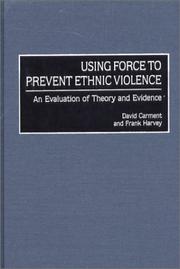
ISBN: 0275969797 Year: 2001 Publisher: Westport (Conn.) : Praeger,
Abstract | Keywords | Export | Availability | Bookmark
 Loading...
Loading...Choose an application
- Reference Manager
- EndNote
- RefWorks (Direct export to RefWorks)
Conflict management --- Conflict management --- Ethnic relations --- Ethnic relations --- Political violence --- Social conflict --- International cooperation. --- Political aspects. --- International cooperation. --- Political aspects. --- Prevention. --- Political aspects.
Book
Abstract | Keywords | Export | Availability | Bookmark
 Loading...
Loading...Choose an application
- Reference Manager
- EndNote
- RefWorks (Direct export to RefWorks)
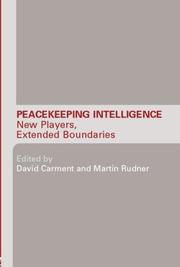
ISBN: 9780415374897 Year: 2005 Publisher: London Routledge
Abstract | Keywords | Export | Availability | Bookmark
 Loading...
Loading...Choose an application
- Reference Manager
- EndNote
- RefWorks (Direct export to RefWorks)
| Listing 1 - 10 of 35 | << page >> |
Sort by
|

 Search
Search Feedback
Feedback About UniCat
About UniCat  Help
Help News
News